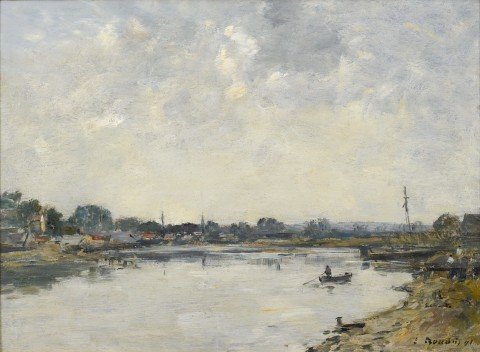One of the earliest French plein-air painters, Eugéne Boudin became known for his marine scenes, especially people and boats along the shores, and for the expansive skyscapes of these canvases. He worked in oil and pastel.
Boudin was born in Deauville, Honfleur, Normandy. His father was a sailor, and as a young man, he worked as a cabin boy on a steamer that sailed on the Seine River between Havre and Honfleur. However, he lost interest in making that activity his life's work, and became especially interested in art when in 1835, his father gave up being a sail and became a frame-maker. Boudin became an assistant in his father's shop, and in that capacity met numerous artists working in the area including Jean-François Millet, Thomas Couture and Constant Tryon. Couture was especially encouraging to the young Boudin to become a dedicated artist, which he did at age 22 when he started painting full time and left the job with his father.
Boudin began traveling around France, and in 1850 when he was age 26, he received a scholarship that allowed him to move to Paris. He became much influenced by 17th Century Dutch masters. Meeting the Dutch painter, Johan Jongkind (1819-1891), regarded as a forerunner of the Impressionism of Claude Monet, Boudin was exposed to plein-air painting and encouraged by Jongkind to pursue it. With Jongkind as his friend, Boudin entered a circle of artists including Gustave Courbet, who, in turn introduced him to Charles Baudelaire, highly influential critic who began publicly praising Boudin and reinforced him in 1859, when Boudin made his debut at the Paris Salon. He became a frequent Salon exhibitor, winning a third-place medal in 1881 and a Gold Medal in 1889 at the Exposition Universelle. Three years later he was made a knight of the Légion of Honor.
Two years earlier, Boudin met Claude Monet, who then worked with Boudin in his studio and became a life-long friend. In 1874, Boudin joined Monet and other Impressionists in the first exhibition of works in that style. However, Boudin did not consider himself nor did others consider him to be as radical as Monet and some of his followers.
As Boudin's career evolved, he traveled extensively beginning in the 1870s, and made frequent trips to Venice, Belgium, the Netherlands and southern France. Towards the end of his life, he suffered ill health and knowing the end was near, returned to his hometown of Deauville to die within view of the water he loved so well.

